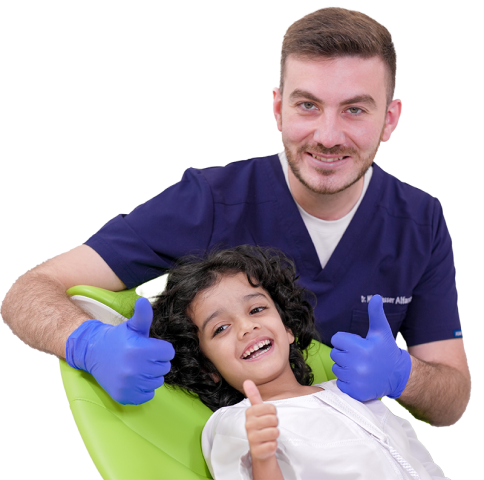General Anesthesia for Kids
Working Hours
We are experts in Children's Dentistry, ages 1-18! , Check our working hours and click Book to continue.
- Saturday 9AM – 10 PM
- Sunday 9AM – 10 PM
- Monday 9AM – 10 PM
- Tuesday 9AM – 10 PM
- Wednesday 9AM – 10 PM
- Thursday 9AM – 10 PM
- Friday 9AM – 10 PM
What is General Anesthesia?
General Anesthesia is a controlled state of unconsciousness, which ensures that your child is fully asleep and free from any sensation during their procedure.
General Anesthesia is only given by anesthetists and are performed in a hospital setting. Anesthetists are specialist doctors who look after children before, during and after the operation and it is their role to ensure children are 'asleep' and safe throughout the operation and wake up comfortably at the end.
When is General Anesthesia Recommended?
Your child’s dentist will only recommend treatments under general Anesthesia if it is really needed, and all other options are ineffective.
General Anesthesia allows dentists to work on unconscious patients for treatments that are particularly painful, difficult, and lengthy. Therefore, your child will be unaware of the dental treatment that is being performed in their mouth.
General Anesthes ia is also ideal for patients whose behavioral problems make it impossible for the dentist to carry out procedures in the dental office.
Who cannot cooperate due to a lack of psychological or emotional maturity and/or mental, physical, or medical disability.
Children with special needs (e.g., autism, mental retardation, cerebral paralysis, down syndrome, …)
For whom local anesthesia is ineffective because of acute infection, anatomic variations, or allergy.
Who are extremely uncooperative, fearful, or anxious.
Requiring immediate, comprehensive oral/dental care (e.g., due to dental trauma, severe infection/cellulitis, acute pain).
requiring significant surgical procedures that can be combined with dental procedures to reduce the number of anesthetic exposures
For whom the use of general anesthesia may protect the developing psyche and/or reduce medical risk.
Who are precommunicative or non-communicative child or adolescent.




General Anesthesia Instructions
- We will meet with you at the clinic to review what to expect the day of surgery for your child.
- We review the treatment plan and your child’s medical history. At this time, please let us know if your child has become sick or if there has been a change in any medical conditions of your child.
- Foods and liquids must be restricted prior to surgery to decrease the risk of vomiting and aspirating any stomach contents which can lead to serious health risks. The hospital will give you specific guidelines on eating and drinking the night before your child’s surgery.
- Please arrive early for your appointment. Arriving late may cause your child’s appointment time to be changed or forfeited.
- At least one parent or legal guardian is required to be present the day of surgery.
- It is recommended to bring an additional adult with you and your child on the day of their surgery, so that one adult can accompany the child in the back seat during the ride home from the hospital.
- A hospital setting, and surgery can be intimidating to a child. Your child will want all of your love and undivided attention before, and after his or her procedure.
- The doctor will review all treatment completed and review post-operative instructions with you.
-
Signs & Symptoms of You Child After Surgery
-
Normal:
- Grogginess or sleepiness
- Disorientation, crabbiness, easily agitated
- Decreased/Increased appetite
- Nausea and vomiting
- Slightly elevated temperature for the first 24 hours
- Slight swelling of lips, gums, cheeks
- Sore throat or nose
-
Abnormal:
- Temperature above 38.6°C
- Elevated temperature lasting longer than 24 hours.
- Vomiting persisting beyond 5 hours
- Difficulty breathing
- If any of these occur contact the hospital immediately.
-
Normal:
- Your child will need to be seen for a follow up appointment in the office 7-10 days following his or her surgery.


